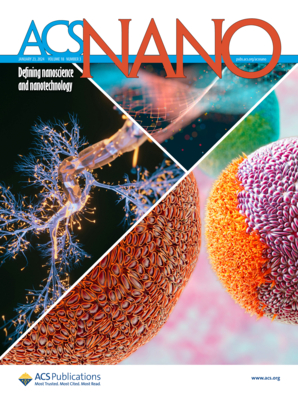双管齐下:通过抑制滑膜增生和改善免疫微环境的仿生多功能mof治疗类风湿关节炎。
IF 15.8
1区 材料科学
Q1 CHEMISTRY, MULTIDISCIPLINARY
引用次数: 0
摘要
成纤维细胞样滑膜细胞(FLSs)和滑膜巨噬细胞(SMs)在类风湿关节炎(RA)的发生和发展中起着重要作用。虽然针对FLSs或SMs的治疗策略取得了一定的效果,但单一治疗往往不能有效缓解滑膜炎。将甲氨蝶呤(MTX)和葡萄糖氧化酶(GOx)负载于咪唑锌骨架-8 (ZIF-8)中,与铂纳米粒子(Pt NPs)和巨噬细胞膜结合,制备了多功能探针mZPMG NPs。mZPMG NPs可以通过药物治疗和饥饿治疗协同抑制FLSs的异常增殖,同时消除过多的活性氧(ROS),促进SMs向m2型巨噬细胞极化。活性氧清除过程产生的氧气可以提高GOx饥饿处理的效率。体内实验表明,mZPMG NPs治疗的胶原诱导关节炎小鼠的临床评分比PBS治疗的小鼠低72.92%。同时,mZPMG组小鼠滑膜增生、炎症浸润、软骨糜烂均有明显抑制作用。因此,本研究提出采用“双管齐下”的策略,抑制FLSs的异常增殖,降低SMs的丰度,实现巨噬细胞复极化,为RA的综合治疗提供了一个有希望的平台。本文章由计算机程序翻译,如有差异,请以英文原文为准。
Dual-Pronged Attack: Biomimetic Multi-Functional MOFs for Rheumatoid Arthritis Therapy via Inhibiting Synovial Hyperplasia and Improving Immune Microenvironment.
Fibroblast-like synoviocytes (FLSs) and synovial macrophages (SMs) contribute significantly to the occurrence and development of rheumatoid arthritis (RA). Although therapeutic strategies targeting FLSs or SMs have achieved certain results, monotherapy often fails to effectively alleviate synovitis. By loading methotrexate (MTX) and glucose oxidase (GOx) in the zinc imidazole framework-8 (ZIF-8) and incorporating with the platinum nanoparticles (Pt NPs) and macrophage membranes, multifunctional probe mZPMG NPs were prepared. The mZPMG NPs can synergistically inhibit the abnormal proliferation of FLSs through drug therapy and starvation therapy, while eliminating excessive reactive oxygen species (ROS) and promoting the polarization of SMs toward M2-type macrophages. Oxygen generated through the ROS scavenging process can enhance the efficiency of the GOx starvation treatment. The in vivo experiments demonstrated that the clinical score of collagen-induced arthritis mice treated with the mZPMG NPs was 72.92% lower than those treated with PBS. Meanwhile, the mice in the mZPMG group exhibited obvious suppression of synovial hyperplasia, inflammatory infiltration, and cartilage erosion. Therefore, this study proposed to adopt a "dual pronged attack" strategy in inhibiting the abnormal proliferation of FLSs and reducing the abundance of SMs to achieve macrophage repolarization, which provides a promising platform for the comprehensive treatment of RA.
求助全文
通过发布文献求助,成功后即可免费获取论文全文。
去求助
来源期刊

ACS Nano
工程技术-材料科学:综合
CiteScore
26.00
自引率
4.10%
发文量
1627
审稿时长
1.7 months
期刊介绍:
ACS Nano, published monthly, serves as an international forum for comprehensive articles on nanoscience and nanotechnology research at the intersections of chemistry, biology, materials science, physics, and engineering. The journal fosters communication among scientists in these communities, facilitating collaboration, new research opportunities, and advancements through discoveries. ACS Nano covers synthesis, assembly, characterization, theory, and simulation of nanostructures, nanobiotechnology, nanofabrication, methods and tools for nanoscience and nanotechnology, and self- and directed-assembly. Alongside original research articles, it offers thorough reviews, perspectives on cutting-edge research, and discussions envisioning the future of nanoscience and nanotechnology.
 求助内容:
求助内容: 应助结果提醒方式:
应助结果提醒方式:


